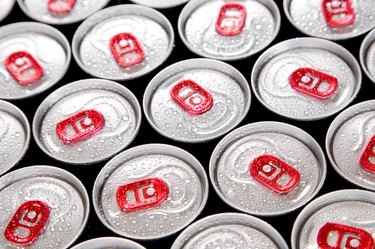
Monster Ultra Paradise and other varieties of the Monster drink provide boosted energy and alertness for short periods of time. However, the temporary energy and alertness boost may not be worth the potential dangers that a Monster drink may pose to you.
Read more: 8 Non-Caffeine Ways to Boost Your Energy
Video of the Day
Video of the Day
Monster Energy Nutrition and Ingredients
Monster Energy drinks are mostly devoid of nutritional value. For example, according to the US Department of Agriculture, a 16 fluid ounce can of Monster Energy provides about 233 calories, 54.2 grams of sugar and 164 milligrams of caffeine. It also provides varying amounts of riboflavin, niacin, vitamin B6 and vitamin B12.
According to Monster Energy Drink's own website, a full 16 ounce can of Monster Energy Drink provides 160 milligrams of caffeine. According to the Food and Drug Administration, most people can consume about 400 milligrams of caffeine a day without dangerous or negative side effects. However, the FDA points out this can vary greatly between people.
Monster Energy Dangers: Caffeine
According to the National Center for Complementary and Integrative Health (NCCIH), there are several potential health and safety concerns. NCCIH indicates that young adults, teens and children are most at risk of developing complications from drinking Monster and other energy drinks. For example, in teens it can lead to disrupted sleep patterns and increases in risk-taking behavior.
According to a review of studies published in October 2014 in Frontiers in Public Health, there are a lot of potential health issues associated with drinking Monster and other energy drinks. The primary concern the review discusses is the caffeine levels found in energy drinks like Monster.
Energy drinks make it easier for a person to develop a caffeine overdose. Symptoms of a caffeine overdose include nausea, vomiting, heart palpitations, high blood pressure and, in rare cases, death. The sugar in Monster can make these symptoms like increased heart rate worse.
In addition, the review mentions other issues with high caffeine consumption. For example, people living with Type 2 diabetes may experience a drop in insulin sensitivity. Women who are pregnant increase their chances of late term miscarriage, underweight babies or stillbirths. Also, you may experience dental issues.
A final effect involves potential behavior changes. Caffeine may increase your risk-taking behavior. It also may encourage the use of substance abuse of drugs and alcohol. For example, according to the NCCIH, college students who consume energy drinks are 25 percent more likely to binge drink. Also, they reported that in 2011, 42 percent of all energy drink-related emergency department visits involved the person mixing energy drinks with alcohol or drugs.
Read more: How Do Caffeine Pills Affect the Body?
Monster Energy Dangers: Sugar
Monster Energy drinks contains over 54 grams of sugar in a 16 ounce container. According to the American Heart Association (AHA), an adult man or woman needs no more and preferably less than 150 calories from sugar a day. Monster Energy Drinks contain approximately 216 calories from sugar. As a result, if you drink just one 16 ounce can of Monster Energy, you are consuming more than the maximum recommended amount of sugar per day.
Regularly consuming too much sugar can lead to heart disease, obesity and the potential to develop Type 2 diabetes. According to Harvard Health, the typical American diet gets 10 to 25 percent of their daily caloric intake from added sugars. You can reduce your risks through decreasing the amount of added sugar you intake daily. In terms of Monster Energy Drinks, this may mean only drinking them once in a while.
- U.S. Department of Agriculture: "Monster Energy Drink"
- Monster Energy: "Monster Energy"
- Food and Drug Administration (FDA): "Spilling the Beans: How Much Caffeine is Too Much?"
- National Center for Complementary and Integrative Health (NCCIH): "Energy Drinks"
- Frontiers in Public Health: "Energy Drink Consumption in Europe: A Review of the Risks, Adverse Health Effects, and Policy Options to Respond"
- Harvard Health: "Eating Too Much Added Sugar Increases the Risk of Dying with Heart Disease"
- American Heart Association: "Sugar 101"